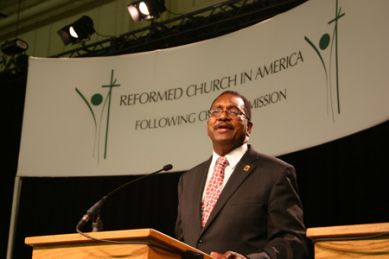Reformed Church President Calls for Focus on Justice

The president of the Reformed Church in America (RCA) has called the group to engage in "ministry from the bottom up" with a focus on social justice.
Speaking on Friday to members of the group's General Synod in Iowa, the Rev. James Seawood said that the RCA has seen a "decline in our collective response to the need for justice domestically and around the world."
"We have not listened as we should to learn with the ear and heart of Jesus about the need for justice, nor have we acted as we should as his hands and feet to ensure justice comes," said Seawood, who pastors at Brighton Heights Reformed Church in Staten Island, New York.
Seawood's remarks were prompted by visits he made around the globe, including in South Africa, the West Bank, and in Haiti, where he witnessed various injustices.
"With all the positive political, economic, and social change that has occurred, including a growing middle class, the majority of South Africans are as poor as ever, uneducated, and fighting for jobs, food, housing, and health care," he said. "The economy is still controlled by the white minority and the Dutch Reformed Church has not repudiated its historic support of apartheid and the heresy of racial superiority as a God-given right to reconcile with the [Uniting Reformed Church in Southern Africa]."
Speaking of his visit to the West Bank, Seawood called the experience "very enlightening as well as heartbreaking."
"Actually standing beside the huge wall that runs through ancestral lands, olive vineyards, and communities and separates Israel and the West Bank impressed upon me the lengths the Israeli government will go to enforce military rule in the area," he said.
Seawood told of the plight of the Palestinian man who he stayed with during his visit, who had to stand in line for four to six hours every day and be searched in order to work in Israel.
"Life on the West Bank is very difficult," Seawood said. "The Palestinians pay more for everything; earn less, if they can find a job; and their living areas are totally controlled by the Israelis."
The RCA president recounted similar disparaging situations in Haiti, noting that his trip there in February "revealed that things were getting worse."
"Reports from church members that have recently visited confirm that international aid is trickling in very slowly and the people are very frustrated as food, shelter, and medical supplies are limited and people continue to die from infection and disease," he said.
Seawood went on to propose that the RCA establish a mission presence in Haiti, working with local partners to respond to the earthquake and to equip congregations and church leaders to build community and overcome poverty.
Furthermore, Seawood reflected on the tensions he saw during his trip that were caused by racism, saying that "everywhere we have traveled, the scourge of racism appears evident in some all over the world."
"Let's dare to talk honestly about the sin of racism and that depth of our sin that it might be revealed to us by the Holy Spirit so that we might be healed and delivered," he said, proposing that the church conduct a two-year dialogue on race, racial righteousness, and racism.
He also urged RCA institutions and agencies to develop ongoing ministry teams that "champion the values, goals, activities, and relationships needed to become more multiracial and freer from racism," and urged that anti-racism training be implemented in the church.
"Brothers and sisters, we need to get out of our comfort zone and learn from the everyday
experiences of the people with whom we minister, review our denominational commitments, and
leap to the side of Jesus to proclaim freedom for prisoners and release for the oppressed," he declared.
Seawood's remarks came during the RCA's 204th General Synod, held from June 10-15 at Northwestern College in Orange City, Iowa.
During the six-day meeting, the group named new presidents and vice presidents of its General Synod and also adopted the Belhar Confession, written in 1980's post-apartheid South Africa, as its fourth "standard of unity" to describe its beliefs.
One of the oldest churches in North America, the RCA traces its beginnings to the first Dutch settlers in the United States. Boasting some 300,000 members across the continent, the RCA was a founding member of the National Council of Churches and the World Council of Churches.
Members of the RCA will be among those participating in a historic merger of Reformed Church associations happening this week in Grand Rapids, Mich.
The Geneva-based World Alliance of Reformed Churches (WARC), of which the RCA is a member, and the Michigan-based Reformed Ecumenical Council (REC) will be joining forces to create an 80-million-member association called the World Communion of Reformed Churches (WCRC)
The alliance will take place during a ten-day conference of the Uniting General Council that begins on Friday.
The WARC currently represents some 75 million Christians in 107 countries, while the REC claims 5 million members in 25 countries.